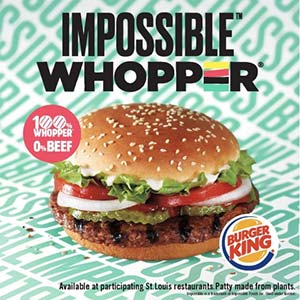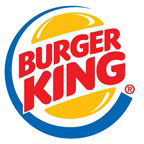Starting April 1, no fooling, 59 Burger King restaurants in and around St. Louis, Missouri, began testing the Impossible Whopper – a flame-grilled, plant-based patty topped with sliced tomatoes, lettuce, mayonnaise, ketchup, pickles and onions on a toasted sesame seed bun.
 Featured in the offering is the Impossible Burger, a faux meat product produced by Impossible Foods. While the Redwood City, California-based supplier’s meat alternative is already on the menu on more than 5,000 restaurants in the United States, Burger King claims this is the first time it is being served by a national QSR chain.
Featured in the offering is the Impossible Burger, a faux meat product produced by Impossible Foods. While the Redwood City, California-based supplier’s meat alternative is already on the menu on more than 5,000 restaurants in the United States, Burger King claims this is the first time it is being served by a national QSR chain.
It should be pointed out, however, that White Castle restaurants rolled out the “Impossible Slider” at 140 outlets in New York, New Jersey and the Chicago area last year. At that time it professed to be America’s first fast food burger joint to feature the meatless product. For the record, the product was actually introduced by Chef David Chang at upscale Momofuki Nishi in New York City during the summer of 2016.
Large-scale production of the Impossible Burger began in September of 2017 at a plant in Oakland, California. The product is made without hormones, antibiotics, cholesterol or artificial flavors. It requires about 75% less water, generates about 87% fewer greenhouse gases, and utilizes around 95% less land than conventional ground beef from cows.
Here are the ingredients: Water, Soy Protein Concentrate, Coconut Oil, Sunflower Oil, Natural Flavors; 2% or less of Potato Protein, Methylcellulose, Yeast Extract, Cultured Dextrose, Food Starch Modified, Soy Leghemoglobin, Salt, Soy Protein Isolate, Mixed Tocopherols (Vitamin E), Zinc Gluconate, Thiamine Hydrochloride (Vitamin B1), Sodium Ascorbate (Vitamin C), Niacin, Pyridoxine Hydrochloride (Vitamin B6), Riboflavin (Vitamin B2), Vitamin B12.
Privately held Impossible Foods was founded in 2011 by Dr. Patrick O. Brown, professor emeritus of biochemistry at Stanford University, and a former Howard Hughes Medical Institute investigator. Among investors in the company are Khosla Ventures, Bill Gates, Google Ventures, Horizons Ventures, UBS, Viking Global Investors, Temasek, Sailing Capital, and Open Philanthropy Project.





